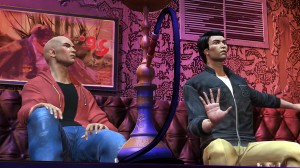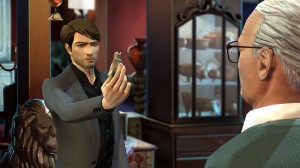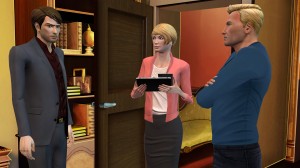Moebius: Empire Rising is the latest game from Jane Jenson, most notably known for the Gabriel Knight series (of which this is a spiritual successor). This latest project is the result of a Kickstarter campaign that raised over $400,000. With so many point and click adventure games hitting the indie scene these days, can Moebius stand out?
Malachi Rector is a very successful antique dealer who specialises in appraising objects and being able to easily determine whether they are forgeries or not. His particular talents are recruited by the secret organisation known as FITA, who ask him to investigate a recent murder. Not to find the killer, however, but simply to determine if the victim shares a connection with a famous figure in history. This simple assignment leads Mr. Rector down a rabbit hole that may well have an impact not only on those around him, but on the whole world.
The story gets off to a rather shaky start. After reading a comic with some painfully bad expositional dialogue, the game starts where the dialogue is just as naff. Why have characterisation or use your imagination to show what your characters are like when you can simply tell the player with canned lines? The main character may as well wear a sign on his head that reads “Smug asshole” while his assistant’s should read “Mothering figure/potential love interest”. The story doesn’t fair much better, as there is no real drive or pace to anything, and no reason to believe that your objectives are of any importance whatsoever.
Having said that, once the game goes on, I did find myself enjoying the characters a lot more. Especially after the introduction of Captain David Walker, who goes on to become Malachi’s bodyguard. He may seem incredibly dull and 2-dimensional but he actually plays off Malachi very well. One is incredibly smart, arrogant, antisocial and always in trouble, while the other is kind, simple and playful. There are even very strong suggestions that the two of them could have a possible gay relationship, something that doesn’t seem to happen much in games (at least until recently).
David Walker, who goes on to become Malachi’s bodyguard. He may seem incredibly dull and 2-dimensional but he actually plays off Malachi very well. One is incredibly smart, arrogant, antisocial and always in trouble, while the other is kind, simple and playful. There are even very strong suggestions that the two of them could have a possible gay relationship, something that doesn’t seem to happen much in games (at least until recently).
A scene in which you see Malachi at his most vulnerable is actually quite dramatic and emotional, even if it does set the stage for what some may call a rather predictable “schmaltzy” character arc. But godam it I like a little schmaltz every now and again and am not ashamed to admit I found myself “awww”ing at the screen on a few occasions. Plus, listening to Malachi constantly make fun of the decorations in peoples homes like a stuck up snob is always fun.
The story improves later on too. It may be silly as all hell and rather ridiculous, but it has all the hallmarks of your standard mystery thriller. From double-crossers, exotic locales, to mysterious thugs chasing you down alleyways. Furthermore it wears it’s influences heavily on it’s sleeves (one of the final achievements is called “Elementary, my dear Watson”).
It isn’t perfect however, infact it all feels a little undercooked and unfinished when all is said and done. This feels like a more than adequate opening act for further investigations, though I was rather surprised when the incredibly rushed finale came by. If the game proves successful, there is evidence to suggest that a sequel may follow, but despite the promise shown at certain points, it could have done with a stronger footing.
 Gameplay is somewhat seen as secondary in adventure games, but there are still certain expectations and levels of quality to be met. Moebius struggles to meet them however. Controls are at their best when you are simple asked to click on objects without needing to walk up to them, which is preferable as Malachi walks so painfully slow, I swear that much of my playtime was simply watching him awkwardly walk about the screen. Thankfully, the option to double click, instantly transporting you to your destination, is useable when navigating, but not when using an item.
Gameplay is somewhat seen as secondary in adventure games, but there are still certain expectations and levels of quality to be met. Moebius struggles to meet them however. Controls are at their best when you are simple asked to click on objects without needing to walk up to them, which is preferable as Malachi walks so painfully slow, I swear that much of my playtime was simply watching him awkwardly walk about the screen. Thankfully, the option to double click, instantly transporting you to your destination, is useable when navigating, but not when using an item.
The clear standout and main thrust of the game is when you are asked to investigate antiques and people, determining their credibility or personality. While I was able to cheat my way through it towards the end using a trick I won’t spoilt in this review, they did still ask you to stop, think and hell, even learn a little history. I found myself a little disappointed when I came across someone I couldn’t give the old Sherklock Holmes “scan over” treatment to.
As for the puzzles themselves, at best they are competent, at worst they consist of baffling, dare I say it stupid logic not befitting of such a clever main character accompanied, by some shoddy design. For example, after the introduction, I receive a mission to head to Venice, though before I can go, I’m told to head back to my shop to make sure I’ve taken care of everything, which I do. Yet still I can’t continue on with the game. What the game actually wanted me to do is look at my table and open a letter from an antique dealer in Venice that will help me on my journey. Instead of making it part of the narrative or a puzzle, the game has to grind to a halt and outright confuse you until you happen upon the correct path.
Another annoyance I found is that you can’t pick up items until you know you HAVE to use them. This may make sense in context but it can be very annoying to see an item that you’re obviously meant to use later, only to be told “I don’t need that right now”, then are forced to backtrack later when you finally discover a use for it.
The gameplay can also jar against the story at times. A finale which is meant to be exciting and tense is all but ruined by an incredibly frustrating cave level which has you exploring and backtracking constantly, getting lost due to the repetitive level design. During this section, you are being chased and have to ensure you don’t get caught. How do you do this? By backtracking until you find some rope, then using it to cause a cave in. It’s like the developers stopped caring after a bit.
One more example to prove my point. At one point, you head to Washington to speak with someone, but realise only too late that you should have brought a gift to impress them. An easy fix you might think, just head to a shop and buy something, right? WRONG. Instead you have to fly back to New York, head to a bar across from your shop, buy some whisky, then fly all the way back to Washington to impress your lady friend. Really? Was that necessary?
should have brought a gift to impress them. An easy fix you might think, just head to a shop and buy something, right? WRONG. Instead you have to fly back to New York, head to a bar across from your shop, buy some whisky, then fly all the way back to Washington to impress your lady friend. Really? Was that necessary?
I could go on with the examples, I really could. At the end of the day however, it mostly runs fine. It could just do with a little less baffling logic.
The presentation of Moebius leaves a lot to be desired, and I’m not just talking about the graphics. The poor sound design stands out more due to pretty bad music (save PERHAPS the menu theme) and almost non existent sound effects (New York has never been so quiet). Plus, Malachi just looks weird. When his shoulder aren’t poking over his neck, he stutters about the screen when walking and at times even tries to imitate John Cleese’s “Ministry of silly walks” routine.
While a lot of this package doesn’t quite add up, the story and interplay of characters is quite fun in Moebius: Empire Rising. It feels as if there is a much better game in here somewhere, which will perhaps come about in a sequel one day. For now though Malachi and co are fine company if your looking for a distraction.

